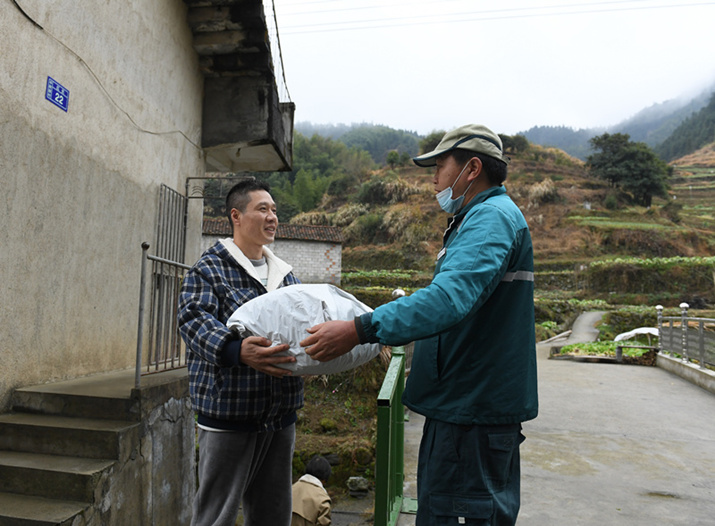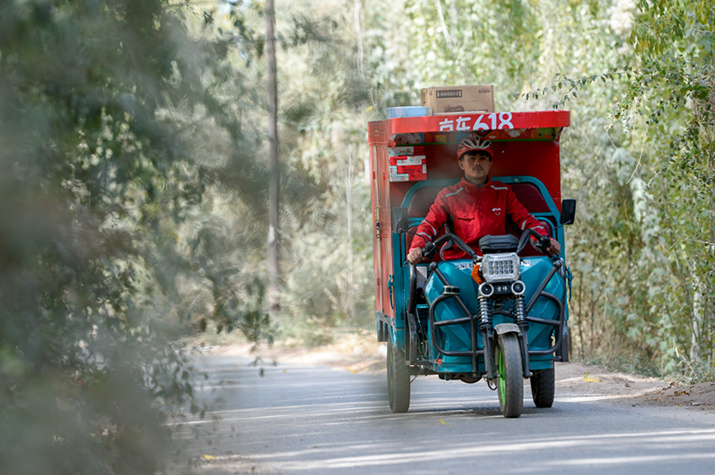|
||||||||||
| Home Nation World Business Opinion Lifestyle ChinAfrica Multimedia Columnists Documents Special Reports |
|
||||||||||
| Home Nation World Business Opinion Lifestyle ChinAfrica Multimedia Columnists Documents Special Reports |
| ChinAfrica |
| China speeds up the development of express delivery in rural areas |
| The development of e-commerce should unleash rural areas' potential for consumption. Simultaneously, express delivery helps promote high-quality agricultural products to be marketed in cities, which will contribute to rural revitalization. |
| By Ge Lijun VOL.13 APRIL 2021 ·2021-03-22 |

A man receives a package in a village in the Hangzhou metropolitan area, Zhejiang Province in east China, on January 26 (XINHUA)
Express delivery is no longer a privilege reserved for city dwellers. Residents of some rural areas in China can now receive packages in their villages and no longer have to go to a distant county to pick them up, thanks to the last-mile delivery service.
The Report on the Work of the Government, unveiled during the Two Sessions in March, stressed that networks for the flow of goods and services in urban and rural areas will be improved, and rural e-commerce and express delivery services will be expanded to spur greater consumption at the county and township levels.
The development of e-commerce should unleash rural areas' potential for consumption. Simultaneously, express delivery helps promote high-quality agricultural products to be marketed in cities, which will contribute to rural revitalization.
Extended services
Seven years ago, express delivery services were only offered at the county level. In 2014, the National Post Office (NPO) launched a project to expand express delivery to the township level. Currently, almost all Chinese townships are served by delivery services. In fact, the universal postal service already covered all rural areas in 2019, but this type of service was not sufficient. In April 2020, the NPO promulgated an action plan (2020-22) to provide express delivery to villages. Three months later, it released a list of six provinces and 15 pilot towns across China. According to the NPO, more than 50 percent of villages were covered by express delivery by 2020.
As a result, more good-quality agricultural products could be marketed in urban areas and meet city dwellers' demand for 100 percent natural products.
Yanwowan Village in Hubei Province, central China, part of the pilot project, is known for its tourism and quality products, including chestnuts and dried fish. Last year, the government cooperated with SF Express, a Chinese delivery company, to implement a demonstration project there, reducing agricultural products' logistics costs by 30 to 40 percent. "This project opens up market opportunities for our agricultural products. And the last-mile logistics service helps us improve our standard of living," Xu Zhixin, First Secretary of the Party Committee for Yanwowan Village, told Economic Daily.
According to the NPO, more than 10 billion parcels of agricultural products were delivered in 2020, with the volume of sales reaching more than 400 billion yuan ($62 billion). The output of some agricultural products, such as yam from Baoding, Hebei Province in north China, and kiwis from Xi'an, Shaanxi Province in northwest China, reached tens of millions of parcels last year. "Rural express shipping and delivery services have fostered the development of the agricultural sector. They can also boost people's consumption in these areas," said Liu Jiang, a researcher at the NPO Development Studies Center.
According to the National Bureau of Statistics, rural residents' consumption-related spending has been steadily increasing over time, from 7,485 yuan ($1,154) per capita in 2013 to 13,713 yuan ($2,115) in 2020.
From everyday products and home appliances to imported goods, residents of Hezhou Village of Fangchenggang City in Guangxi Zhuang Autonomous Region, south China, now have a wider choice for their purchases. The delivery service in the village has boosted the enthusiasm of local people for online shopping. "I bought clothes and appliances online. And I can receive all my packages right in my village," Chen Jinfu, living in Hezhou, told People's Daily. To some extent, the advent of express delivery has changed the lifestyle of rural residents.
At the same time, delivery is driving job creation. Since 2014, the postal mail and express delivery industry has provided employment to more than 1.5 million people from rural areas. From January to August 2020 alone, the figure was 150,000.

A delivery man in the middle of his rounds in Kashgar, Xinjiang Uygur Autonomous Region in northwest China, on October 18, 2019 (XINHUA)
Favorable measures
To achieve the goal of covering all Chinese villages by 2022, targeted measures have been implemented by governments and express delivery companies.
New policies are continuously issued at the national level. In early 2021, the Central Document No. 1 on agriculture and rural areas called for accelerating the construction of the logistics system at the county, township and village levels and improving infrastructure in the countryside to promote e-commerce.
Cooperation between post offices and express delivery companies is also proving to be effective. The state-owned post offices have opened up their rural distribution network to delivery companies. When the parcels from the delivery companies arrive in the townships, the local post offices take over the delivery. In the Raohe County of Heilongjiang Province in northeast China, several delivery companies have opted for this type of cooperation. According to their managers, these companies have increased their business by more than 30 percent, while saving 25 percent of the vehicles and 20 percent of the staff. And the honey produced in this region has been marketed in cities at a much lower price.
Companies are also getting ready to penetrate the rural areas. For the past two years, Cainiao, the logistics arm of Alibaba, JD.com, an e-commerce platform, and SF Express have improved their services in these remote areas. Faced with a difficult geographical terrain and unstable demand, many other service providers have decided to join forces to share the delivery network.
Multiple measures, such as cooperation with local public transport for parcel transportation and drones in some mountainous regions, are fully implemented to facilitate delivery in very remote areas.
Currently, only half of the villages have access to express delivery nationwide. The target to be achieved by the end of 2021 is to cover 100 percent of China's territory in the east, 80 percent in the center, and 60 percent in the west, depending on the geographical location and level of development of each area.
"Parcel delivery is much more time-consuming in rural areas. We want to get more subsidies," Liu Hao, who has been working as a deliveryman for more than 10 years in the mountainous county of Mengyin, Shandong Province in east China, told ChinAfrica. Some experts believe that policies on subsidies and tax relief should be enacted as soon as possible to help enterprises cope with difficulties such as high operating costs.
(Print Edition Title: Traversing the Last Mile)
Comments to glj@chinafrica.cn
|
||
| About Us | Contact Us | Advertise with Us | Subscribe |
| Copyright Beijing Review All rights reserved 京ICP备08005356号-5 京公网安备110102005860号 |